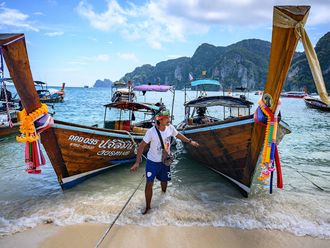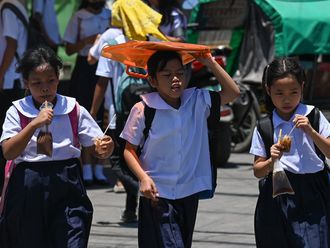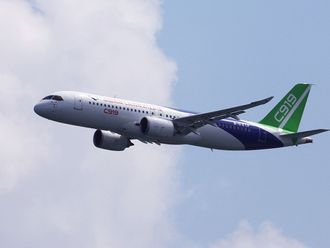Seoul: North Korea took a swing at the new South Korean government and its hard line toward Pyongyang yesterday by expelling the South's officials at a joint factory park north of the border and hailed as a model of cooperation.
The South Korean government, in office barely a month, has pushed the touchy and destitute North to clean up its human rights record, repatriate its citizens held by the communist state and make progress on nuclear disarmament.
"The government deeply regrets the North's measure," Kim Ho-nyoun, said a Unification Ministry spokesman.
The predawn expulsion of South Korean officials at the Kaesong industrial site, on the north side of the heavily defended border, is one of the most aggressive moves in years by the North against its wealthy neighbour.
"You can see this move as North Korea trying to train the new South Korean government and put pressure on it," said Park Young-ho, an expert on the North at the South's Korea Institute for National Unification.
Emergency meeting
President Lee Myung-bak convened an emergency meeting to discuss the expulsion.
The North's official media has yet to report that Lee has become president, the first conservative in the job after a decade of left-of-centre leaders.
North Korea's KCNA news agency this month quoted an official as warning that conservative elements in Seoul were upsetting ties by "letting loose malignant vituperation, slandering and defiling even the regime and system in the DPRK (North Korea)."
Another Unification Ministry official said the North had told 11 South Korean officials on Monday they would have to leave the site, finally forcing them out before dawn last day.
"The North cited Unification Minister Kim Ha-joong's comments that, without the resolution of the nuclear problem, there won't be any expansion of the Kaesong project," the official said.
Some 23,000 North Koreans work at the park, about 70km northwest of Seoul, that houses nearly 70 South Korean factories producing clothing, shoes, watches and other goods for salaries a fraction of those in the South.
South Korean Foreign Minister Yu Myung-hwan had said in Washington on Wednesday that major powers were losing patience with Pyongyang's failure to produce a full accounting of its nuclear programme as required under a 2005 deal.
Detente: Difficult journey
- August 1971 to 1972 - The two Koreas hold their first formal discussions since the end of the 1950-53 Korean War. Preliminary talks sputter due to lingering animosity. The two eventually issue a statement on July 4, 1972, calling for an independent and peaceful reunification.
- November 1998 - First South Korean tourists visit the Mount Kumgang resort in North Korea, which was built by an affiliate of the South's Hyundai Group. Nearly 2 million South Koreans, who are limited as to where they can go and what they can see by North Korean guides and soldiers, have visited since then. US officials have questioned the resort, saying it might be a cash cow for the North's leaders.
- June 15, 2000 - Leaders from the two countries hold their first summit in Pyongyang. The meeting of the then South Korean president Kim Dae-jung and North Korean leader Kim Jong-il led to increased cooperation and ushered in a brief era when the reclusive North began to open itself to the outside world.
- August 15, 2000 - The two hold the first reunion for families separated by the Korean War.
- June 2003 - Groundbreaking for the Kaesong industrial park.
- May 2007 - North and South Korea run their first trains across their border since the Korean War.
- October 2007 - The leaders of the two Koreas hold their second summit with the South proposing joint economic projects that analysts said could cost billions of dollars.












